Gaming the Sino-Japanese War (II)
- By Peter Harmsen
- 19 October, 2013
- 2 Comments
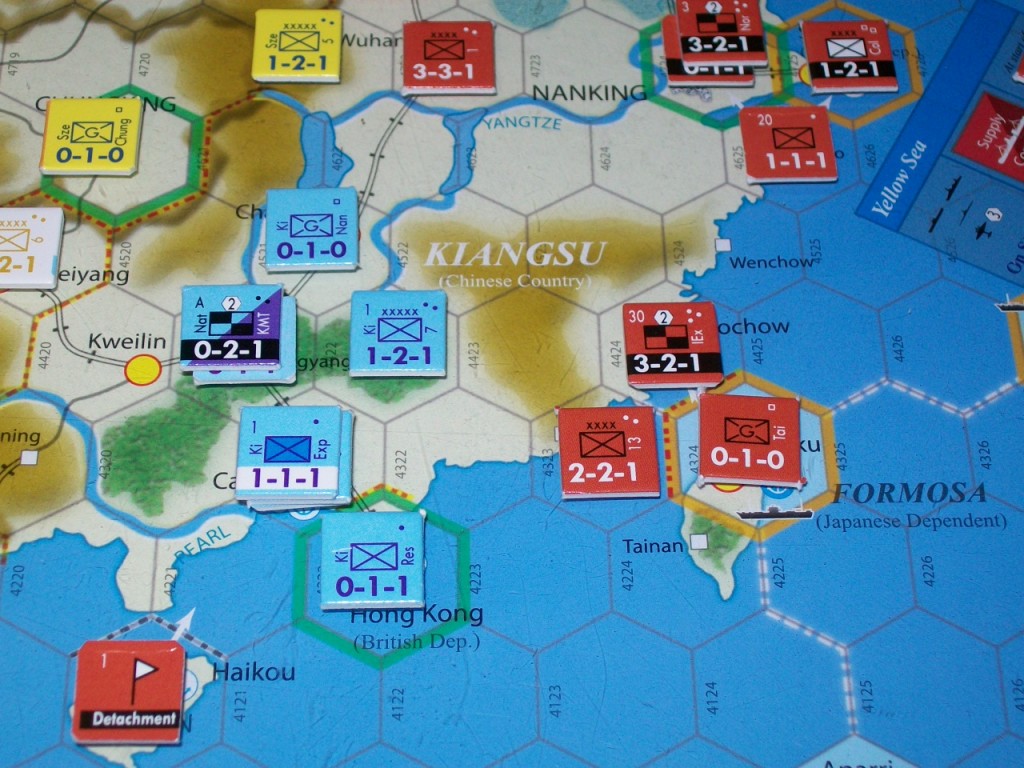 History is pretty much set in stone (although it’s open to constant re-interpretation), but for those experiencing past events first-hand the future was still undetermined, and things could have turned out in an endless variety of different ways. It was malleable and dependent on human action. Luckily for those interested in history, it’s possible to try out the roles of historical actors, facing the same choices as the real actors did. This is by means of war games, not least in the traditional board-game variety. One of the most ambitious recent examples of approaching the Second Sino-Japanese War and the larger Asia-Pacific conflict from 1937 to 1945 is Axis Empires: Dai Senso from Decision Games. We asked Thomas Prowell, one of the game’s designers, to introduce the game to us, and we bring the second part of a two-part interview below. Photos from actual gameplay are provided by ER Bickford, whose detailed photographic record of a campaign game spanning the entire eight-year war can be found here.
History is pretty much set in stone (although it’s open to constant re-interpretation), but for those experiencing past events first-hand the future was still undetermined, and things could have turned out in an endless variety of different ways. It was malleable and dependent on human action. Luckily for those interested in history, it’s possible to try out the roles of historical actors, facing the same choices as the real actors did. This is by means of war games, not least in the traditional board-game variety. One of the most ambitious recent examples of approaching the Second Sino-Japanese War and the larger Asia-Pacific conflict from 1937 to 1945 is Axis Empires: Dai Senso from Decision Games. We asked Thomas Prowell, one of the game’s designers, to introduce the game to us, and we bring the second part of a two-part interview below. Photos from actual gameplay are provided by ER Bickford, whose detailed photographic record of a campaign game spanning the entire eight-year war can be found here.
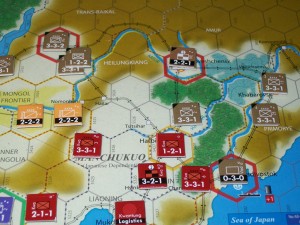 Q: The Soviet factor is more prominent in Dai Senso than run-of-the-mill Pacific War games. What prompted this design choice?
Q: The Soviet factor is more prominent in Dai Senso than run-of-the-mill Pacific War games. What prompted this design choice?
A: This is a result of the decision to tell the story of the war from Japan’s point-of-view. There were several elements in the Japanese military itching for a fight with the Soviet Union; the border incidents of 1938 could have easily sparked a full-scale war. We had to offer this as a possibility to our players or we wouldn’t be telling the full story.
Q: The game begins in 1937, which is already significantly earlier than the 1941 starting date adopted by most Pacific War games. Could it have been extended all the way back to 1931 with the Japanese invasion of Manchuria?
A: Originally, the start date was going to be in Fall 1939, which was the same time that the then-current version of Totaler Krieg opened. (Remember, Dai Senso, was designed to be linkable with Totaler Krieg for players who wanted to do all of World War II.) We recognized early on that the 1939 start date was not letting us fulfill our main objective for Dai Senso: to tell the story of the war from Japan’s point of view. It was also a pretty boring time to open the Pacific game — with Japan already so mired in China as it historically was, we were creating a situation where the game opened with a good two years of static play before the wider Total War time period begins.So we considered a 1937 start date to see how that worked out. That decision brought with it two design hurdles we had to overcome. First, of course, the earlier start had to work well in the Pacific, which it did. But second, the earlier start also had to work in Europe … which wasn’t even at war yet!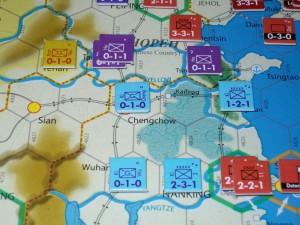
Thankfully, Europe’s history from 1937 to 1939 is really fascinating. We were able to come up with an easy way for the players in Totaler Krieg to fight the Spanish Civil War and also make some interesting pre-war choices for their countries. Germany has to decide which territorial claims it will make — the historical ones of Austria, Czechoslovakia and Polish Corridor, or alt-history choices like Switzerland or parts of Belgium, Denmark or the Baltic States? The Soviet Union can choose between Stalin’s historical purges, building a line of forts, or modernizing its military. The West has choices to make too regarding its diplomatic options and the state of the French military. In short, the 1937 start date worked really well in both games, so we were happy with the decision.
But this is why going back all the way to 1931 wouldn’t work for Dai Senso — because it wouldn’t work at all in Totaler Krieg. Even in the Pacific, there would be too much downtime for the players, I think. Still, there will be something in the Axis Empires Expansion Kit which may interest your readers who want to consider what a 1931 different start could look like. In addition to the air/naval module I mentioned earlier, the Expansion Kit will have a “Random Campaign Generator.” This is a feature that will allow players to explore all sorts of alt-history World War Twos, based on questions like: what would have happened if Germany had won World War I? What if the Whites had won the Russian Civil War? What if Austria-Hungary or the Ottoman Empire had survived the Great War? What if there hadn’t been a Great Depression? And so on and so on. In the Pacific, “What would have happened if Japan hadn’t invaded Manchuria?” is just one of the many alternate possibilities.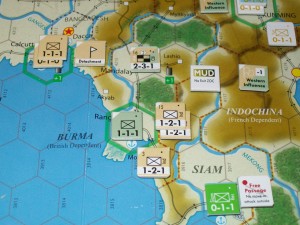
Q: More generally, are games mainly entertainment, or do you see them as a way to gain insights into the past?
A: The best wargames are both. The reason I came to the Totaler Krieg system — after years of playing Third Reich and World in Flames — is because I found the game to be both more entertaining and more insightful than the competition.
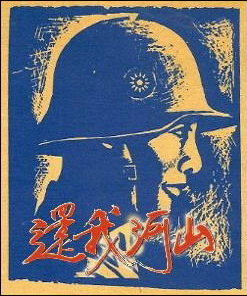


 Copyright © 2025
Copyright © 2025
Thanks for sharing. There’s another interesting board game to simulate this history is “War of the Suns (天無二日)”.
If you’re interested, you can visit here:
Rule Book:
http://www.multimanpublishing.com/LinkClick.aspx?fileticket=FzXqCYrYTYw=
Board Game Geek:
http://boardgamegeek.com/boardgame/21149/war-suns
https://boardgamegeek.com/boardgame/8544/battle-china-first-edition
https://boardgamegeek.com/boardgameexpansion/8546/more-battle-china
These are two board wargames I have designed on the war in China; the first is 1937-41, the second is an expansion that takes the war to 1945 and then to the Civil War. Strategic (division to army) scale. And here is a list of other board wargames on the war in China 1937-45:
https://boardgamegeek.com/geeklist/200119/item/4297779#item4297779